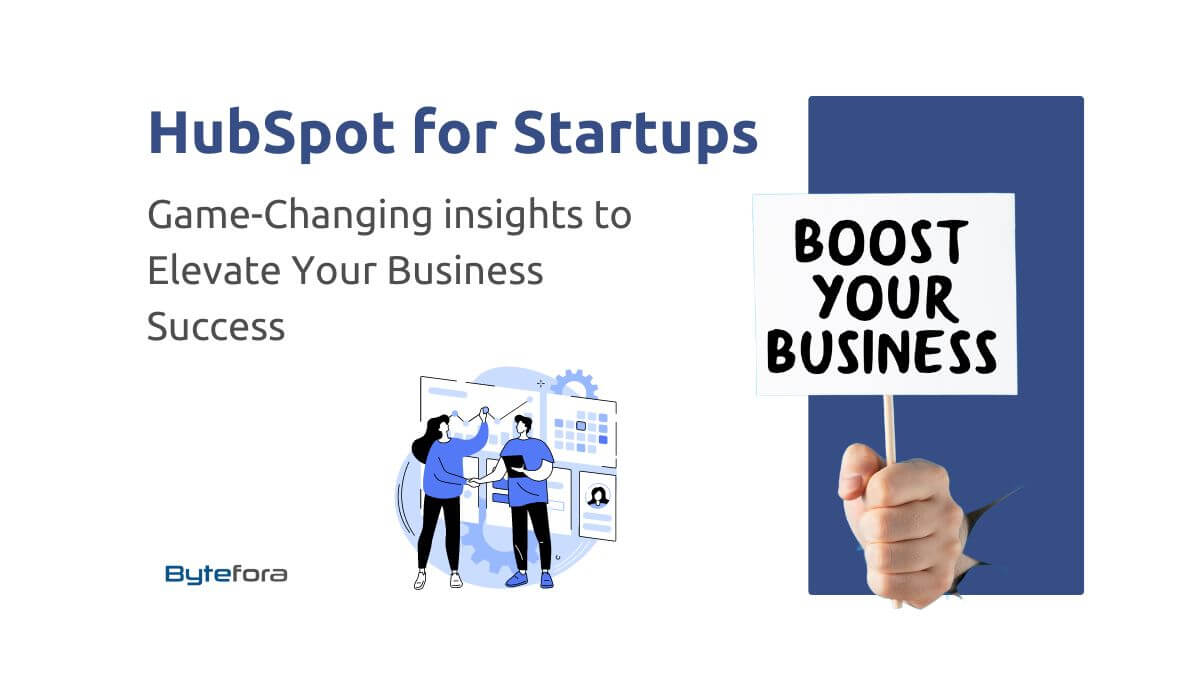Hey there, startup innovator! Ready to launch your startup into more success?? If you’re nodding yes, Considering HubSpot for a startup could be the boost your business needs to soar to new heights. In this deep dive, we will explore how HubSpot’s ingenious suite of features can revolutionize how startups engage with customers, market their products, and streamline their sales. Whether you’re looking to fine-tune your marketing strategies, optimize customer relations, or get your business processes humming with efficiency, HubSpot has your back. So, buckle up and get ready to discover how HubSpot can be the game-changing ally in your startup’s journey to greatness!
Table of Contents
Understanding HubSpot and Its Offerings
In the realm of startups, agility and efficiency are crucial. HubSpot, a name that resonates strongly in this space, offers an array of solutions tailor-made for startups’ unique challenges and ambitions. Let’s delve deeper into what HubSpot is and what it offers to understand why it’s becoming a go-to choice for startups around the globe.
What is HubSpot?
HubSpot is a comprehensive growth platform crafted meticulously to assist businesses, particularly startups, in their growth journey. It’s an integrated suite of tools designed to support various facets of business operations, including marketing, sales, customer service, and content management. What sets HubSpot apart is its inherent ability to scale alongside your business, making it a versatile choice for startups at any stage.

Core Features of HubSpot
CRM (Customer Relationship Management): HubSpot’s system is renowned for its user-friendliness and robust capabilities. It helps startups keep track of all customer interactions and data, streamlining processes and ensuring a comprehensive understanding of customer needs and behaviors. This leads to more personalized customer experiences and helps build stronger, more lasting relationships.
Marketing Hub: This is where HubSpot truly shines for startups looking to boost their marketing efforts. The Marketing Hub offers many tools for inbound marketing strategies, such as email marketing, content creation, SEO, and social media management. It’s designed to attract the right audience, convert more leads, and run complete inbound marketing campaigns at scale.
Sales Hub: The Sales Hub simplifies and enhances the sales process. It includes email tracking, meeting scheduling, deal tracking, and performance metrics. This hub is designed to help sales teams close more deals faster by automating mundane tasks and providing insightful sales data to refine strategies.
Service Hub: Exceptional customer service can set your startup apart. The Service Hub offers tools like ticketing systems, customer feedback surveys, and knowledge bases. These features help manage and resolve customer issues efficiently, fostering customer loyalty and retention.
CMS Hub: Your online presence is crucial in today’s digital age. The CMS Hub allows startups to easily manage their website content, ensuring it’s informative, engaging, and optimized for search engines. This hub simplifies creating and modifying digital content, making it accessible even for those without technical expertise.
Operations Hub: HubSpot’s latest addition, the Operations Hub, brings a new level of efficiency and connectivity. It integrates your data, tools, and teams, automating business processes and synchronizing customer data into a clean, connected CRM.
Why Startups Need a Tool Like HubSpot
Startups operate in a dynamic, fast-paced ecosystem where agility and rapid innovation are crucial to survival and growth. This environment is often marked by fierce competition, evolving customer demands, and the need to quickly adapt to market changes. In such a landscape, startups require tools that are not just efficient but highly adaptable and scalable. The ability to quickly implement, modify, and scale business operations is crucial for maintaining a competitive edge and fostering long-term sustainability. This is where comprehensive tools like HubSpot come into play, offering a suite of solutions that cater to the ever-changing needs of the startup world.
Addressing Key Startup Challenges with HubSpot
Resource Optimization: One of the primary challenges startups face is operating with constrained resources, including limited staff and tight budgets. HubSpot’s suite of tools helps streamline various business processes, allowing small teams to work more efficiently. By automating routine tasks such as email responses, social media posts, and lead tracking, HubSpot frees up staff to focus on more strategic and creative tasks, thus maximizing the potential of limited human resources.

Customer Acquisition and Retention: Gaining new customers and retaining existing ones is the lifeline of any startup. HubSpot excels in this area with its robust CRM system that helps startups track and analyze customer interactions and behavior. This data is crucial for personalizing customer experiences, tailoring marketing strategies, and ultimately building solid and lasting customer relationships.
Data-Driven Decision Making: Startups must be agile and make quick, informed decisions. HubSpot offers robust analytics and reporting tools that provide insights into various aspects of the business, from marketing campaign effectiveness to sales trends and customer service efficiency. Access to this data allows startups to make evidence-based decisions, adapt strategies quickly, and allocate resources more effectively.
Scalability and Flexibility: As startups grow, their business tools must succeed. HubSpot’s platform is highly scalable, offering more advanced features and integrations as the startup expands. This flexibility means startups don’t need to switch systems as they grow, ensuring a smooth and continuous operational flow.
Streamlining Sales Processes: Efficiently managing the sales pipeline is crucial for startup growth. HubSpot’s Sales Hub is designed to simplify sales, from lead generation to closing deals. The platform offers features like automated lead nurturing, pipeline management, and performance analytics, which not only help increase sales efficiency but also improve the quality of customer interactions throughout the sales process.
Benefits of Marketing Automation for Startups
Efficient Marketing Operations: Marketing is critical to a startup’s growth strategy. HubSpot’s marketing automation tools make these efforts more efficient. Automating email campaigns, social media scheduling, and lead nurturing means that marketing teams can focus on creating more innovative and strategic marketing initiatives rather than being bogged down by repetitive tasks.
Targeted Marketing Campaigns: HubSpot enables startups to craft highly targeted marketing campaigns based on detailed customer data and behavior insights. This level of targeting leads to more effective and engaging marketing initiatives, ultimately resulting in better conversion rates and a higher return on investment.
Content Management and SEO: A solid online presence is vital for startups, and HubSpot’s CMS and SEO tools assist in creating and managing effective online content. These tools help startups optimize their content for search engines, ensuring better visibility and engagement with their target audience.
Customer Service and Engagement
Enhanced Customer Support: Providing excellent customer service is crucial for building brand loyalty and trust. HubSpot’s Service Hub offers tools that help manage and resolve customer issues efficiently. Features like ticketing systems, customer feedback surveys, and chatbots ensure customer queries are addressed promptly and effectively.
Building a Knowledge Base: An informative knowledge base can significantly enhance customer experience by providing quick and easy access to information. HubSpot enables startups to create and manage a comprehensive knowledge base, which not only aids customers in finding solutions independently but also reduces the pressure on customer support teams.
Real-World Success Stories
The effectiveness of HubSpot is further underscored by many success stories from startups across various sectors. These case studies demonstrate how startups have leveraged HubSpot to overcome their unique challenges, streamline operations, and achieve remarkable growth and efficiency. They are real-world examples of HubSpot’s versatility and effectiveness in driving startup success.
Getting Started with HubSpot for Your Startup
Embarking on the HubSpot journey is pivotal for startups looking to streamline operations and boost growth. Here’s how to get started with HubSpot for your startup, ensuring you leverage its full potential from the get-go.
Setting Up HubSpot
Creating Your Account: The first step is straightforward – sign up for a HubSpot account. This process involves choosing a plan that fits your startup’s current needs. HubSpot offers various tiers, including free options with essential features, making it accessible for startups at any stage. When signing up, you’ll be asked to provide basic information about your business, which helps tailor the HubSpot experience to your needs.
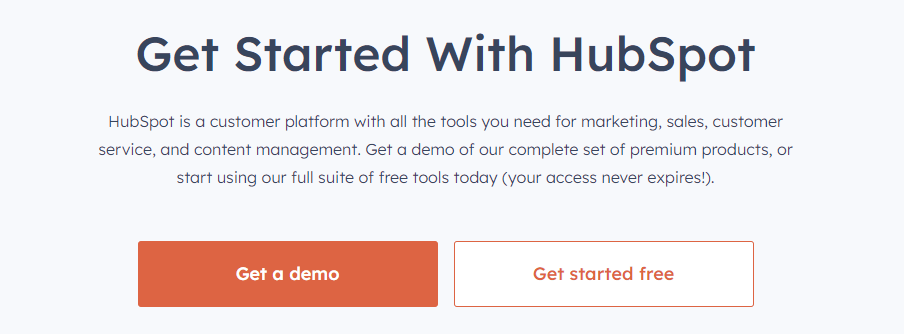
Customizing Your Dashboard: Once your account is active, you’ll be greeted with a dashboard that can be customized to suit your startup’s particular requirements. HubSpot offers a highly intuitive interface where you can add or remove widgets and tools based on what you need most. Whether it’s keeping an eye on your sales pipeline, monitoring marketing campaigns, or tracking customer interactions, setting up your dashboard to reflect your priorities helps keep critical data at your fingertips.
Integrating HubSpot with Other Tools
Startups often use a variety of tools for different business functions. Integrating these with HubSpot is crucial for a seamless workflow. HubSpot offers many integration options with popular tools like Gmail, Slack, WordPress, and more. This integration facilitates the centralization of data and processes, making managing and analyzing information across platforms easier. To integrate, navigate to the ‘Integrations’ section in HubSpot and follow the prompts to connect your other business tools.
Training Your Team on HubSpot
Utilizing HubSpot Resources: HubSpot is renowned for its extensive training resources. HubSpot Academy, for instance, offers free online training courses covering various aspects of the platform and general business skills. Encouraging your team to take these courses helps them understand how to use HubSpot effectively and equips them with valuable industry knowledge.
Hands-on Practice: There’s no substitute for hands-on experience. Encourage your team members to explore the platform, experiment with different features, and use HubSpot in their daily tasks. This practical application solidifies their understanding and helps identify additional training needs or areas where HubSpot can be further leveraged.
Best Practices for Effective Use
To fully benefit from HubSpot, it’s crucial to adopt some best practices:
Regular Data Updates: Up-to-date customer and business data in HubSpot is essential for accurate insights and decision-making.
Consistent Usage: Encourage your team to use HubSpot consistently. This ensures data integrity and maximizes the platform’s process management effectiveness.
Stay Informed: HubSpot regularly updates its features and offers new tools. Staying informed about these updates allows you to continually improve your platform use and take advantage of new functionalities.
Maximizing HubSpot’s Potential for Startups
Adopting HubSpot is just the beginning. To truly harness its power for your startup, it’s essential to understand and utilize its full range of capabilities. Here’s how you can maximize HubSpot’s potential for your startup’s advantage.
Utilizing HubSpot for Marketing Strategies
Email Marketing: HubSpot’s email marketing tools allow you to create personalized and targeted email campaigns. These tools enable you to segment your audience based on various criteria like past behavior, demographics, and engagement levels, ensuring that your emails are relevant and practical. Utilizing A/B testing features can also help refine your email strategy for better open and click-through rates.
Social Media Management: HubSpot provides a centralized platform to manage all your social media channels. You can schedule posts, track engagements, and analyze the performance of your content across different platforms. This comprehensive view allows you to tailor your social media strategy for better reach and engagement, aligning it with your overall marketing goals.
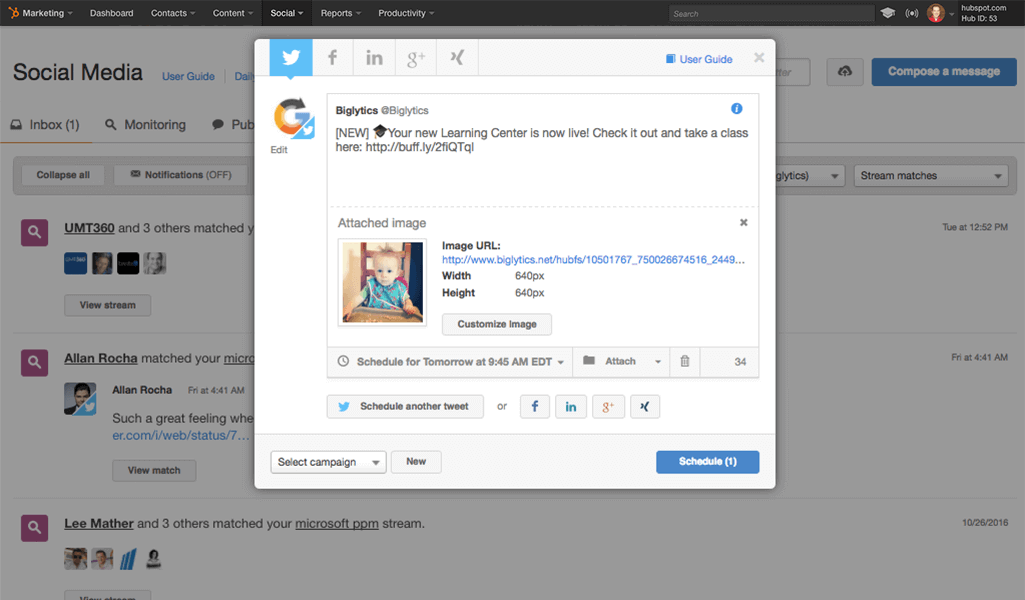
SEO and Content Marketing: HubSpot offers tools to enhance your SEO efforts and content marketing strategies. These include keyword research tools, content optimization tips, and performance tracking. By utilizing these tools, startups can improve their online visibility, attract more website traffic, and engage their audience with valuable content.
Enhancing Sales Processes with HubSpot
Lead Tracking and Management: HubSpot’s CRM system excels in tracking and managing leads. You can monitor the journey of each lead from the initial point of contact through to conversion. This tracking allows for more effective nurturing of leads and a better understanding of which strategies are most effective at converting leads into customers.
Pipeline Management: Effective pipeline management is crucial for closing sales. HubSpot allows you to visualize your sales pipeline, track the progress of deals, and identify any bottlenecks that might be slowing down the sales process. This visibility helps in prioritizing efforts and forecasting sales more accurately.
Sales Automation: Automating repetitive sales tasks is a crucial feature of HubSpot. From sending follow-up emails to updating deal stages, automation can save valuable time and ensure no opportunities are missed. This frees up your sales team to focus more on engaging with prospects and closing deals.
Providing Stellar Customer Service
Using HubSpot’s Service Hub: The Service Hub is designed to enhance your customer service. It includes tools like ticketing systems to efficiently manage and resolve customer issues, customer feedback tools to gather insights, and chatbots for instant customer support. These tools help build a robust customer service framework essential for customer satisfaction and retention.
Creating a Knowledge Base: HubSpot enables you to create a comprehensive customer knowledge base. This self-service option empowers customers to find answers to their questions without waiting for a response, thereby improving the customer experience and reducing the workload on your support team.
Automating Customer Support: Implementing automation in customer support, such as using chatbots for initial inquiries or setting up automated email responses for common questions, can significantly improve efficiency. It ensures customers receive timely responses, improving their overall experience with your startup.
Analyzing and Improving with HubSpot’s Analytics
In the data-driven world of startups, understanding and acting on analytics is crucial. HubSpot provides various analytics tools that offer deep insights into various business aspects. Here’s how you can use these tools to analyze and improve your startup’s performance.
Understanding HubSpot Analytics
HubSpot’s analytics tools are designed to provide comprehensive insights into your business operations. They cover various data points, from website traffic and user behavior to marketing campaign effectiveness, sales performance, and customer service efficiency. These tools are integrated across the various HubSpot Hubs, providing a unified view of your business’s performance. By understanding these analytics, you can identify areas of success, pinpoint issues that need attention, and better understand your customer’s journey and preferences. This holistic view is essential for making informed decisions that drive business growth.
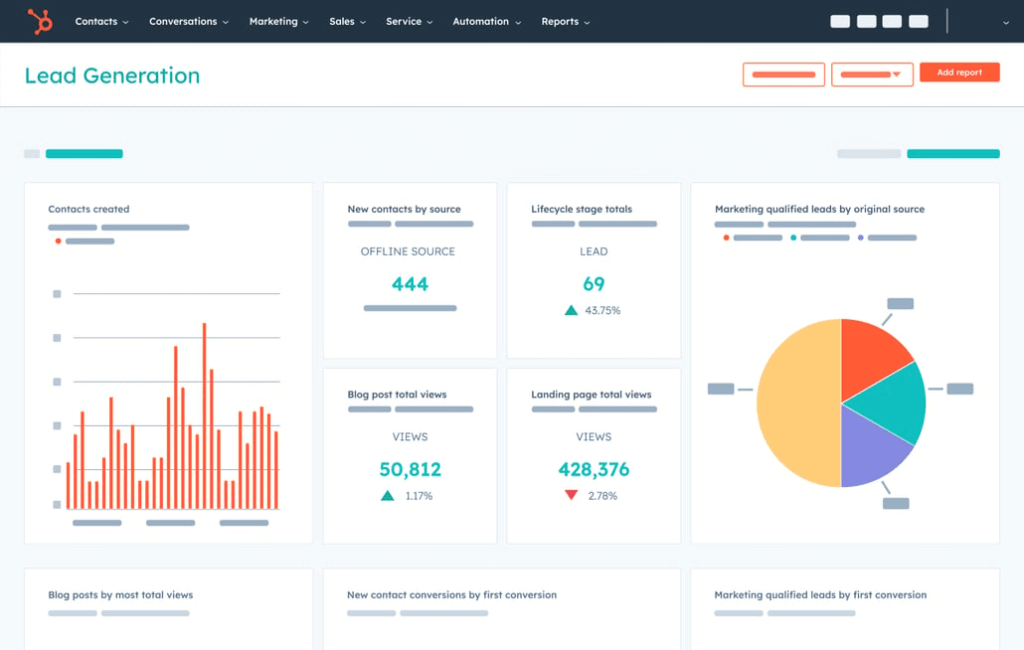
Making Data-Driven Decisions
Identifying Trends: HubSpot’s analytics help identify positive and negative trends across different business areas. For example, you can track changes in website traffic, email campaign performance, or customer engagement over time. Recognizing these trends allows you to understand what is working well and what isn’t so you can replicate successful strategies and address areas needing improvement.
Refining Marketing Strategies: Marketing analytics in HubSpot are exceptionally robust. They provide insights into the performance of your marketing campaigns, including email opens, click-through rates, social media engagement, and content interactions. By analyzing this data, you can refine your marketing efforts to better target your audience, personalize your messaging, and optimize your content for higher engagement and conversion rates.
Enhancing Sales Processes: Sales analytics in HubSpot give an overview of your sales team’s performance, track deal closure rates, and monitor the health of your sales pipeline. This data is crucial for identifying effective sales strategies, understanding the average sales cycle, and pinpointing areas in the sales process that may need improvement or additional resources.
Continuously Improving Your Processes
The true power of HubSpot’s analytics lies in their ability to inform continuous improvement in your business processes. Regularly reviewing and acting on the insights provided by HubSpot can lead to incremental improvements in all areas of your business. This might include adjusting your marketing campaigns based on customer response, fine-tuning your sales approach to better meet customer needs, or modifying your customer service processes for greater efficiency. Over time, these improvements can lead to significant growth and success for your startup.
HubSpot for Startups: Pricing and Plans
For startups, choosing the right pricing plan for their tools is as crucial as selecting the tools themselves. HubSpot understands this and offers a range of pricing options to suit different stages of a startup’s journey. Let’s break down these plans and what they offer, helping you make an informed decision that aligns with your business needs and budget.
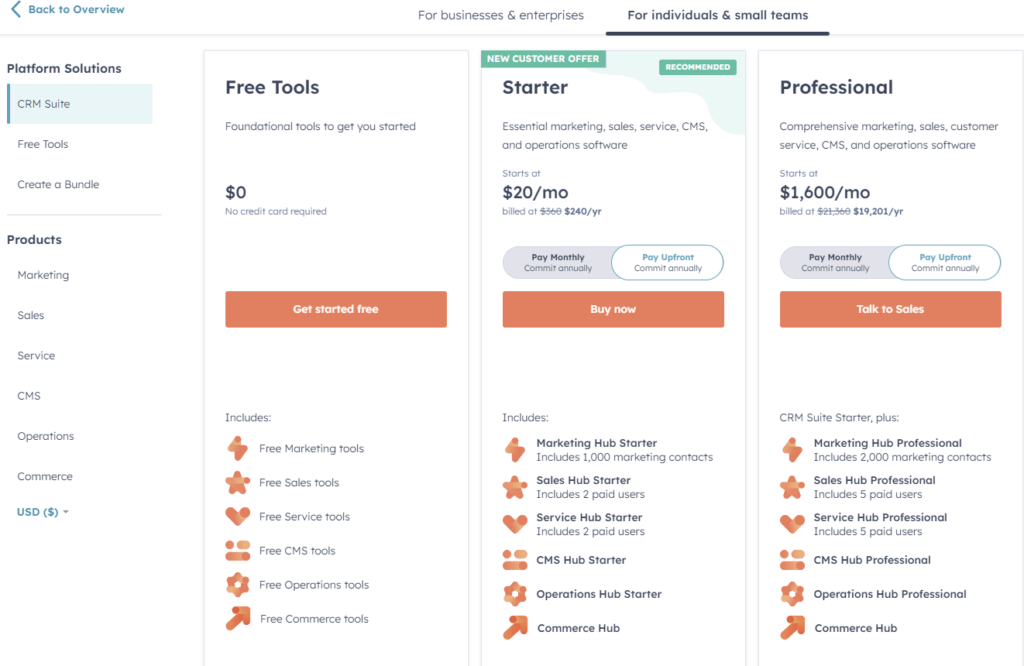
Overview of Different Plans
Free Tools: HubSpot’s free tools are an excellent starting point for early-stage startups. These tools provide basic functionalities in CRM, marketing, sales, and customer service. They include contact management, deal tracking, and simple marketing tools like email marketing and social media posting. This plan is ideal for startups that are just beginning to structure their customer relationship management and marketing efforts but have yet to be ready for advanced features.
Starter Plan: As a startup begins to grow and needs more sophisticated functionalities, the Starter Plan comes into play. This plan offers more advanced features like conversational bots, simple automation, and basic reporting. It’s designed for startups that have outgrown the free tools and need more capabilities to manage increasing customer interactions and data but must still be mindful of budget constraints.
Professional Plan: The Professional Plan is tailored for startups looking to scale up their operations. This plan includes more comprehensive automation, advanced reporting, enhanced marketing tools like SEO and content strategy, and social media monitoring and reporting. It also offers more sophisticated sales tools like pipeline management and forecasting, making it suitable for startups with a larger customer base and a more complex sales process.
Enterprise Plan: The Enterprise Plan offers top-tier functionalities and support for larger startups or those with complex needs. This includes advanced features like predictive lead scoring, custom reporting, and user roles and permissions. The Enterprise Plan is ideal for startups that have grown significantly and require high customization and control over their CRM and marketing automation tools.
Choosing the Right Plan for Your Startup
Selecting the right HubSpot plan involves carefully assessing your startup’s current and future needs. Consider factors like the size of your customer base, the complexity of your marketing and sales processes, and the level of customer support required. It’s also important to factor in your budget and projected growth. Startups should choose a plan that fits their current needs and allows room for growth as they scale.
Tips on Budget Management with HubSpot
- Start Small: It’s often wise for startups to start with free tools or the Starter Plan and then scale up as their needs grow. This approach helps manage costs while still leveraging HubSpot’s powerful features.
- Assess Regularly: Regularly review your usage of HubSpot and the benefits you’re gaining from it. This assessment will help you decide whether to upgrade, downgrade, or maintain your current plan.
- Utilize Training Resources: HubSpot offers a wealth of training and educational resources. Maximizing these resources can help you get the most value from your chosen plan, ensuring your team uses HubSpot to its full potential.
HubSpot Resources and Support for Startups
When you’re running a startup, every resource counts. This is where HubSpot shines, offering a range of resources and support systems tailored to the unique needs of burgeoning businesses. Let’s dive into what makes HubSpot an invaluable partner for startup success.
Educational Resources
HubSpot Academy is a goldmine for startups looking to sharpen their marketing, sales, and customer service skills. With many free courses and certifications, you can empower your team to master inbound marketing, learn about content creation, dive into social media strategies, and more. These courses are not just theoretical; they provide practical insights you can apply directly to your startup.

Blogs and Webinars
Keeping up with the latest trends in marketing and sales is crucial for startup growth. HubSpot’s blog is a treasure trove of information, offering insights into emerging trends, practical tips, and success stories. Additionally, their regular webinars allow you to learn from industry experts and get your questions answered in real time.
Community and Networking
Startups thrive on networking, and HubSpot understands this. You can access a network of like-minded entrepreneurs and experts by joining the HubSpot community. This community is an excellent platform for sharing experiences, seeking advice, and building relationships to help your startup grow.
Customer Support and Consultancy
Navigating the early stages of business can be challenging, but HubSpot’s customer support team is there to help. Whether you need technical assistance, strategic advice, or help maximizing the platform’s potential, their team is just a call or click away. For more personalized guidance, HubSpot also offers consultancy services to help tailor their tools to your startup’s needs.
Continuous Learning and Improvement
Finally, HubSpot is committed to continuously updating its resources and support to match the evolving needs of startups. This means you can always expect the latest and best practices in the industry, helping your startup stay ahead of the curve.
HubSpot isn’t just about providing tools; it’s about offering a comprehensive ecosystem of resources and support designed to help startups grow and succeed. From educational materials to an engaged community and dedicated customer support, HubSpot equips you with everything you need to navigate the challenging but exciting journey of building a startup.
Future of CRM and HubSpot’s Role in it for Startups
In today’s rapidly evolving digital landscape, understanding future Customer Relationship Management (CRM) trends is crucial for startups. HubSpot, a leader in this field, plays a key role in shaping these trends. Let’s delve deeper into the future of CRM and how HubSpot is positioned at the forefront of this evolution.
Evolving CRM Trends
The CRM industry is continuously evolving, adapting to technological advancements and changing consumer behaviors. Future CRM systems are expected to be more integrated, offering seamless experiences across sales, marketing, and customer service. Artificial Intelligence (AI) and machine learning are becoming integral, providing deep insights and automating routine tasks. Personalization is another key trend, as CRMs increasingly focus on delivering tailored customer experiences based on data-driven insights. These advancements are about improving efficiency and creating more meaningful and engaging interactions with customers.
HubSpot’s Role in Shaping CRM’s Future
Integration and Scalability: HubSpot has long been a proponent of integration, combining various aspects of business operations into one platform. This approach is increasingly important as businesses seek tools that offer comprehensive solutions. For startups, this means having a system that fits their current scale and grows with them, adapting to their evolving needs without the hassle of switching between different tools.
AI and Machine Learning: HubSpot is more aggressively integrating AI and machine learning into its platform. These technologies allow startups to automate repetitive tasks, gain predictive insights about customer behavior, and tailor their strategies based on actionable data. For startups, this means being able to do more with less, focusing on growth and innovation while the AI handles the routine tasks.
Customer-Centric Approach: HubSpot’s focus on customer-centricity aligns well with the future direction of CRM. It’s about understanding and meeting the needs of customers more effectively. HubSpot helps startups gather and analyze customer data, draw insights, and apply these to create more personalized and effective customer journeys. This approach is crucial in building long-term customer relationships and loyalty.

The Impact on Startups
For startups, aligning with these future CRM trends is essential for staying competitive and relevant. HubSpot provides a platform that meets these futuristic needs and offers an intuitive and accessible approach. By adopting HubSpot, startups can position themselves at the cutting edge of CRM innovation. This means they can leverage the latest tools and methodologies to enhance customer engagement, streamline operations, and drive growth, all while being supported by a platform that understands and evolves with the startup ecosystem.
Conclusion
And there we are, at the end of our insightful journey exploring HubSpot for a startup. From the nitty-gritty of getting started to envisioning the future of CRM, we’ve covered a lot of ground. With its comprehensive suite of tools and forward-looking approach, HubSpot stands as a beacon for startups navigating the sometimes choppy waters of business growth and customer relationships.
As we wrap up, remember that HubSpot is more than just a platform; it’s a growth partner tailored for the unique challenges and opportunities that startups face. It’s about bringing efficiency, insight, and scalability into your daily operations. Whether it’s through streamlining your sales process, personalizing your marketing efforts, or delivering stellar customer service, HubSpot is equipped to help your startup soar to new heights.
So, as you step forward in your startup journey, keep HubSpot in your arsenal. Embrace its capabilities, grow with its evolving features, and let it empower you to meet and exceed your business goals. The world of startups is dynamic and challenging, but with tools like HubSpot, you’re more than ready to make your mark.
Additional Resources
For insights on tools that can be integrated with HubSpot, explore :
- GetResponse Article: Comprehensive GetResponse Tutorial: Mastering Email Marketing
- MailerLite Article: What Is MailerLite Used For? Explore it’s 10 Powerful Aspects That Amplify Email Marketing
- ClickFunnel Article: Mastering ClickFunnels for Real Estate: An Ultimate Guide
We’d love to hear your thoughts and experiences, so please feel free to leave a comment below!

